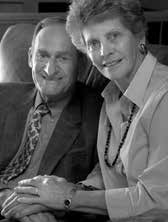Daniel and Karen Mayers
There was a time when ending homelessness in the District of Columbia seemed impossible. Today, many people, including Daniel and Karen Mayers, believe that goal is within reach. That is why they have donated $100,000 to begin the Dan and Karen Mayers’ Challenge. The Challenge aims to raise $1 million for the Partnership to End Homelessness. It is with a sense of both urgency and optimism that Dan and Karen challenge others to join them in ensuring that homelessness is rare, brief and non-recurring in DC.
“In the past, homelessness was seen as an intractable problem,” says Dan, a leader in charitable giving in DC for nearly six decades. “Today, we have the leadership, tools, plan, and political will to end homelessness. The only thing missing is critical resources.”
“It’s easy to feel overwhelmed trying to address the many important issues facing our city,” adds Karen. “Here is a concrete problem with a concrete solution.”
In partnership with the District government’s Interagency Council on Homelessness, The Community Foundation has identified an effective way for the local philanthropic community to play a significant role in ending homelessness. The core elements of the Partnership include coordination and engagement of the local business and philanthropic communities, a grant fund to support expenses that transition individuals and families from shelters into homes, and an impact investment that aims to increase the supply of deeply affordable and supportive housing for the District’s most marginalized residents.
A Long History of Philanthropy
Dan and Karen credit The Community Foundation with informing their philanthropy and introducing them to the region’s most effective nonprofits going back many years. Dan is The Community Foundation’s longest serving board member, having previously served as chair of the Board of Directors and of the Governance Board of The Community Foundation’s September 11 Survivors’ Fund. A retired senior partner at the Washington, DC, law firm WilmerHale, he was board chair of the Harvard Law School Visiting Committee, Legal Action Center, National Child Research Center, National Symphony Orchestra, Sidwell Friends School and WETA.
A retired social worker, Karen also has seen the District’s challenges up close while serving as board chair of House of Ruth, vice chair of Iona Senior Services, board member of Home Care Partners and the Higher Achievement Program and, most recently, as a member of The Community Foundation’s Sharing DC Advisory Committee.
More and more, Dan and Karen have focused their philanthropy on groups serving low-income individuals and families. Dan helped to guide The Community Foundation’s Neighbors in Need Fund, established during the recession to strengthen the region’s safety-net providers and services, and the couple were major donors to the fund.
A Lasting Impact
In making the inaugural gift to launch the Dan and Karen Mayers’ Challenge, they hope to inspire others who share their concern for the District’s marginalized residents. They also are motivated by a desire to have a lasting impact in the city they have called home for 60 years.
Dan and Karen recognize that their gift—a substantial percentage of their philanthropic dollars—is just a beginning. But, says Karen, “we have no doubt that the community is up to this challenge.” So far, the Challenge has raised $600,000 from the Mayers’ family, friends and The Community Foundation’s Board of Trustees.
“This is what community foundations do—they respond to community need,” adds Dan. “Time and again, I’ve witnessed The Community Foundation galvanize the generosity of concerned residents. I’ve seen compassionate people rally around urgent community needs, from natural disasters to 9/11 to the recession.”
Bruce McNamer, The Community Foundation’s President and CEO, echoed Dan and Karen’s optimism: “It’s hard to fathom living in such a wealthy society and not coming together to solve this problem. Together, let’s ensure that every one of our neighbors has a safe and stable place to call home.”
Learn More
To learn more about the Partnership to End Homelessness, visit EndHomelessnessDC.org. If you would like to contribute to the Mayers’ Challenge, please contact Angela Willingham, Associate Vice President of Development or give online.


